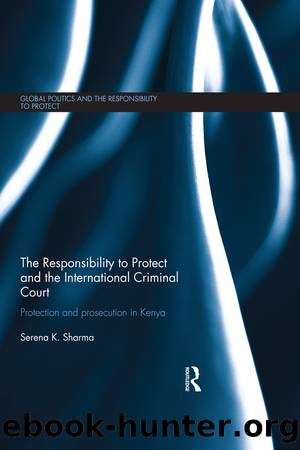Prevention and the Responsibility to Protect: The Case of Kenya by Serena Sharma

Author:Serena Sharma [Sharma, Serena]
Language: eng
Format: epub
Tags: International, Africa, Military, History, Law, General
ISBN: 9780415507509
Google: V4xiXwAACAAJ
Goodreads: 14867915
Publisher: Routledge
Published: 2013-05-12T00:00:00+00:00
The IDP situation in Kenya
As noted in Chapter 1, the 2007 General Elections resulted in massive levels of displacement. Whereas internal displacement had already been a persistent problem before the 2007 polls, the most recent pattern of displacement exacerbated the extent of Kenyaâs IDP crisis.34 The majority of those displaced remained within Kenya, while a smaller proportion fled across the border to Uganda. As the Kenyan Red Cross observed, the conditions within Kenyaâs displacement communities fell well below accepted international standards. Displacement camps were overcrowded, had poor sanitation and were rampant with disease. Compounding these issues were frequent attacks by criminal gangs and an over-extended police force that proved unable to provide for the protection of displaced communities.
During the Kenyan National Dialogue and Reconciliation process, the displacement crisis was identified as the principal task relating to Agenda Item 2 (Addressing the Humanitarian Crisis). Once the Coalition Government was formed, both principals assured that they were committed to resolving the IDP crisis. In May 2008, the government launched âOperation Return Homeâ (Rudi Nyumbani), a nationally sponsored IDP resettlement programme. Rudi Nyumbani has, however, been heavily criticised by Human Rights groups for a number of reasons: the programme failed to ensure the security of returning IDPs; it was not preceded by reconciliation efforts between communities; it had no provisions for financial compensation to those affected; and it was ill equipped to address the needs of vulnerable groups within the displaced population (including HIV affected groups and children).35 Most crucially, Rudi Nyumbani overlooked how high tensions were in the aftermath of the violence, which made it difficult â and, in some instances, impossible â for some communities to return home. The success of the governmentâs national resettlement programme has therefore been limited.36 According to one estimate âapproximately 200 000 of the 350 000 persons who fled their homes as a result of the post-election violence had not returned.â37
There are strong grounds to question the authenticity of the Governmentâs commitment to resolving the IDP Crisis. Despite fundraising efforts to assist IDPs, most of this compensation has not made its way to those who need it the most. Moreover, up to KSH500 million was reportedly stolen from funds specifically allocated to Kenyaâs IDPs.38 In some instances, actual names of internally displaced individuals were used to extract the funds. Although corruption scandals have become a fixture of Kenyan politics, this particular scandal constitutes the ultimate betrayal of Kenyaâs displaced communities.
Despite the continuing displacement crisis, the donor community exerted minimal pressure on the Government to resolve this issue. Throughout the KNDR process and beyond, the issue of IDPs has been viewed predominantly as a matter of humanitarian concern; nevertheless, the issue of resettlement has clear security implications. As Lucy Hannon has observed, âaffected migrant and slum populations are the poorest of the poor, and disenfranchised and dispossessed, among the most likely to turn to violence again in their frustration.â39
Whereas donor governments have been relatively silent on the issue of IDP resettlement, much more pressure has been applied to the Coalition Government in relation to constitutional reform.
Download
This site does not store any files on its server. We only index and link to content provided by other sites. Please contact the content providers to delete copyright contents if any and email us, we'll remove relevant links or contents immediately.
| Africa | Americas |
| Arctic & Antarctica | Asia |
| Australia & Oceania | Europe |
| Middle East | Russia |
| United States | World |
| Ancient Civilizations | Military |
| Historical Study & Educational Resources |
Never by Ken Follett(2873)
The Man Who Died Twice by Richard Osman(2291)
Machine Learning at Scale with H2O by Gregory Keys | David Whiting(2269)
Fairy Tale by Stephen King(2059)
Will by Will Smith(2033)
Rationality by Steven Pinker(1761)
The Dawn of Everything: A New History of Humanity by David Graeber & David Wengrow(1566)
The Dark Hours by Michael Connelly(1564)
Principles for Dealing With the Changing World Order: Why Nations Succeed and Fail by Ray Dalio(1368)
Friends, Lovers, and the Big Terrible Thing by Matthew Perry(1324)
A Short History of War by Jeremy Black(1295)
HBR's 10 Must Reads 2022 by Harvard Business Review(1251)
Go Tell the Bees That I Am Gone by Diana Gabaldon(1231)
Can't Hurt Me: Master Your Mind and Defy the Odds - Clean Edition by David Goggins(1223)
515945210 by Unknown(1205)
Fear No Evil by James Patterson(1106)
443319537 by Unknown(1070)
Works by Richard Wright(1017)
Going There by Katie Couric(989)
